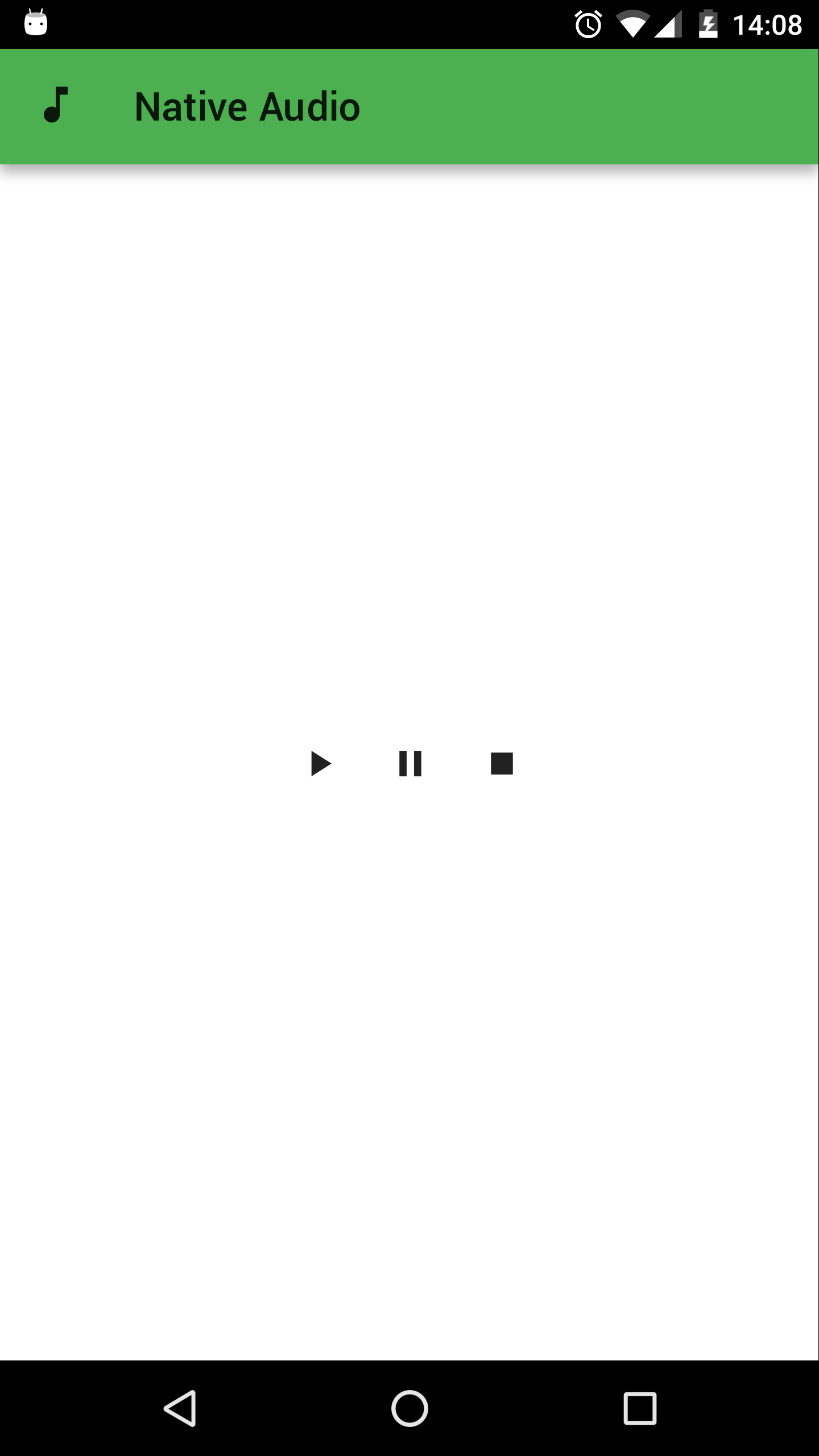javafxports, как вызвать Android родной Media Player
Поскольку javafxports Media еще не реализован, вместо этого я собираюсь использовать Android Native MediaPlayer. Кто-нибудь знает как это сделать.
2 ответа
Если вы посмотрите здесь пример GoNative ( документы и код), вы найдете способ добавить собственный код Android в ваш проект JavaFX.
Это простой пример добавления android.media.MediaPlayer в проект JavaFX с помощью плагина Gluon.
Основываясь на проекте Single View, давайте сначала добавим интерфейс с необходимыми сигнатурами методов аудио:
public interface NativeAudioService {
void play();
void pause();
void resume();
void stop();
}
Теперь в нашем представлении мы можем создать кнопки для вызова этих методов на основе экземпляра AndroidNativeAudio класс, который реализует NativeAudioService интерфейс:
public class BasicView extends View {
private NativeAudioService service;
private boolean pause;
public BasicView(String name) {
super(name);
try {
service = (NativeAudioService) Class.forName("com.gluonhq.nativeaudio.AndroidNativeAudio").newInstance();
} catch (ClassNotFoundException | InstantiationException | IllegalAccessException ex) {
System.out.println("Error " + ex);
}
if (service != null) {
final HBox hBox = new HBox(10,
MaterialDesignIcon.PLAY_ARROW.button(e -> service.play()),
MaterialDesignIcon.PAUSE.button(e -> {
if (!pause) {
service.pause();
pause = true;
} else {
service.resume();
pause = false;
}
}),
MaterialDesignIcon.STOP.button(e -> service.stop()));
hBox.setAlignment(Pos.CENTER);
setCenter(new StackPane(hBox));
} else {
setCenter(new StackPane(new Label("Only for Android")));
}
}
@Override
protected void updateAppBar(AppBar appBar) {
appBar.setNavIcon(MaterialDesignIcon.MUSIC_NOTE.button());
appBar.setTitleText("Native Audio");
}
}
Теперь мы создаем собственный класс в папке Android. Это будет использовать Android API. Он попытается найти аудиофайл audio.mp3 что мы должны разместить под /src/android/assets папка:
package com.gluonhq.nativeaudio;
import android.content.res.AssetFileDescriptor;
import android.media.AudioManager;
import android.media.MediaPlayer;
import java.io.IOException;
import javafxports.android.FXActivity;
public class AndroidNativeAudio implements NativeAudioService {
private MediaPlayer mp;
private int currentPosition;
public AndroidNativeAudio() { }
@Override
public void play() {
currentPosition = 0;
try {
if (mp != null) {
stop();
}
mp = new MediaPlayer();
AssetFileDescriptor afd = FXActivity.getInstance().getAssets().openFd("audio.mp3");
mp.setDataSource(afd.getFileDescriptor(), afd.getStartOffset(), afd.getLength());
mp.setAudioStreamType(AudioManager.STREAM_RING);
mp.setOnCompletionListener(mp -> stop());
mp.prepare();
mp.start();
} catch (IOException e) {
System.out.println("Error playing audio resource " + e);
}
}
@Override
public void stop() {
if (mp != null) {
if (mp.isPlaying()) {
mp.stop();
}
mp.release();
mp = null;
}
}
@Override
public void pause() {
if (mp != null) {
mp.pause();
currentPosition = mp.getCurrentPosition();
}
}
@Override
public void resume() {
if (mp != null) {
mp.start();
mp.seekTo(currentPosition);
}
}
}
Наконец, мы можем развернуть проект на работающем устройстве Android gradlew androidInstall,

Собственный аудиоплеер использовался в следующем примере:
https://gist.github.com/bgmf/d87a2bac0a5623f359637a3da334f980
Помимо некоторых предварительных условий, код выглядит так:
package my.application;
import my.application.Constants;
import javafx.beans.property.ReadOnlyObjectProperty;
import javafx.beans.property.ReadOnlyObjectWrapper;
import org.robovm.apple.avfoundation.AVAudioPlayer;
import org.robovm.apple.foundation.NSErrorException;
import org.robovm.apple.foundation.NSURL;
import org.robovm.apple.foundation.NSURLScheme;
import java.io.File;
import java.util.logging.Level;
import java.util.logging.Logger;
public class NativeAudioServiceIOS extends PathHelperIOS implements NativeAudioService {
private static final Logger LOG = Logger.getLogger(NativeAudioServiceIOS.class.getName());
private static final String DIR_NAME = Constants.OBJECTS_BASE_PATH;
private final ReadOnlyObjectWrapper<Status> status = new ReadOnlyObjectWrapper<>(this, "status", Status.STOP);
private String filename = null;
private AVAudioPlayer player = null;
public NativeAudioServiceIOS() {
super();
}
@Override
public void init(String filename) throws NativeServiceException {
this.filename = filename.startsWith("/") ? filename.substring(1) : filename;
LOG.warning("Called with file: " + filename);
status.set(Status.STOP);
try {
if(!filename.startsWith("/")) filename = "/" + filename;
File fullfile = new File(pathBase.getAbsolutePath() + filename);
if(fullfile.exists()) {
NSURL fullurl = new NSURL(NSURLScheme.File, "", fullfile.getAbsolutePath());
LOG.log(Level.SEVERE, "Loading URL: " + fullurl);
// Create audio player object and initialize with URL to sound
player = new AVAudioPlayer(fullurl);
LOG.log(Level.SEVERE, "Player initialized: " + player);
status.set(Status.STOP);
} else {
LOG.log(Level.WARNING, String.format("Audiofile doesn't exist: %s (%s / %s)",
fullfile.getAbsolutePath(),
pathBase.getAbsolutePath(),
filename));
player = null;
status.set(Status.ERROR);
}
} catch(NSErrorException error) {
LOG.log(Level.SEVERE, "Audio Setup Failed: " + error.toString(), error);
status.set(Status.ERROR);
}
}
@Override
public void play() throws NativeServiceException {
if(player == null) return;
player.play();
status.set(Status.PLAY);
}
@Override
public void pause() throws NativeServiceException {
if(player == null) return;
player.pause();
status.set(Status.PAUSE);
}
@Override
public void resume() throws NativeServiceException {
if(player == null) return;
player.play();
status.set(Status.PLAY);
}
@Override
public void stop() throws NativeServiceException {
if(player == null) return;
player.stop();
player.setCurrentTime(0.0);
status.set(Status.STOP);
}
@Override
public ReadOnlyObjectProperty<Status> statusProperty() {
return status.getReadOnlyProperty();
}
@Override
public Status getStatus() {
return status.get();
}
}